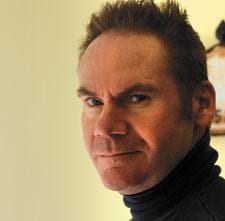If a Canadian and an American get into a conversation that lasts more than five minutes, inevitably the topic of healthcare is going to come up.
I’m having coffee with American ex-pat author Thom Vernon, now a Toronto resident, to talk about his new novel, The Drifts, which was launched by Coach House Books earlier this month. But in predictable fashion, we’ve started our discussion with the differences in how our two nations treat the sick.
“In America, we have this demonization of sickness,” he says. “It’s like if you get sick it’s your fault and you deserve the consequences. Canada’s totally different. Here, there is a social safety net, and the dominant cultural value is that when people get sick, the state should be responsible for helping them.”
Healthcare is on the mind of at least one of the characters in The Drifts; Dol, a middle-aged father of two, decides to undergo gender transition to become female, only to have his employer cut off his health benefits.
Dol is in a relationship with Wilson, a heterosexual woman who’s so butch everyone thinks she’s a man. Wilson hooked up with Dol after breaking off her affair with Charlie, who’s married to Julie. Julie and Charlie have two grown daughters who’ve left home to seek their fortunes in Hollywood, but much to Julie’s surprise she’s pregnant again. She wants to terminate the pregnancy, but Charlie won’t hear of it.
“There ain’t no hope for a nation that kills its own children,” he says.
Set in the tiny rural town of Bay, Arkansas, The Drifts follows the lives of the four characters over one evening when a giant snowstorm is set to bury the town and the few thousand people who live in it.
“I knew that a blizzard was going to be part of the story from the very beginning,” Vernon says. “I kept coming back to the idea of weather -because the book is about gender roles, bodies and how we move through the world. In a blizzard, we cover up our bodies more, and it changes how we physically move through the world.”
Though he grew up primarily in Lansing, Michigan, Vernon’s family originally hailed from Arkansas, and he often travelled there in the summer.
“I was a bit of an oddball as a kid, and so I think my grandmother thought I’d appreciate it,” he laughs. “In Arkansas, I fit in somehow. I’m actually related to almost everyone in Bay. Going there as an adult, I was shocked to meet all these strangers and see my face in them.”
The American South in general and Arkansas in particular are places that people who have never visited often have strong preconceptions about.
“If I had a motivation in writing this book, it would be to challenge the perception of what Arkansas is and what the South is,” he says. “There’s this general perception of it being bigoted, ignorant and racist, but that’s not how I experienced it.”
Vernon was in Arkansas recently to do a reading, and his extended family got wind of it and planned to attend.
“My sister made a call to my great uncle to scope things out and see if it was going to be uncomfortable,” he says. “When my sister asked if my uncle had a problem with my being gay, he just said, ‘Oh, people down here don’t care about that. As long as you’re a good person, that’s all that matters.’”


 Why you can trust Xtra
Why you can trust Xtra


